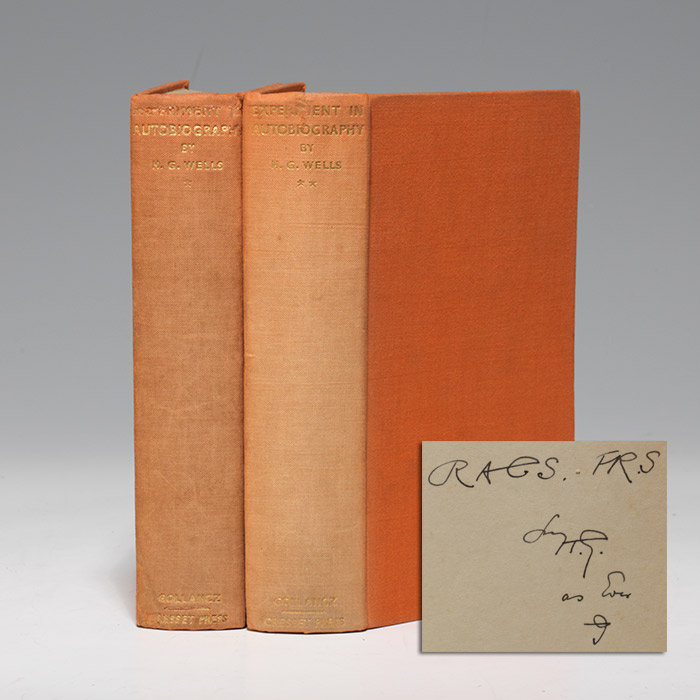
INSCRIBED BY H.G. WELLS TO HIS CLOSE FRIEND AND SCIENTIFIC ADVISOR
WELLS, H.G. Experiment in Autobiography. Discoveries and Conclusions of a Very Ordinary Brain (Since 1866). London: Victor Gollancz and The Cresset Press, 1934. Two volumes. Octavo, original orange cloth. $1500.
First edition, illustrated with many portraits, photographs and drawings, inscribed by Wells on the half title of Volume I to his close friend and scientific advisor, "RAGS FRS from HG as ever."
"Descriptions of the late-Victorian social scene from the standpoint of the servants' hall are followed by impressions of Arnold Bennett, Joseph Conrad, Henry James, George Gissing and other contemporaries" (H.G. Wells Society 120). Without scarce dust jackets. Hammond E32. Inscribed to noted British scientist and Wells' lifelong friend Sir Richard Arman Gregory. Gregory is mentioned in two places in this autobiography, most notably on page 237 where Wells references Gregory as one of his "faithful associates" who "kept me from becoming a failure absolutely." In Wells' first work of fiction, he dedicated the work to Gregory as his "dearest friend." The two met while students at the Normal School of Science in South Kensington. They jointly authored a textbook, Honours Physiography, in 1891. Reportedly, Gregory was the one person with whom Wells never quarreled. A professor of astronomy, Gregory also possessed expertise in physics, chemistry and other disciplines; he wrote several textbooks and eventually assumed the editorship of the journal Nature, to which Wells frequently contributed. The author often turned to Gregory, and to the experts Gregory contacted on Wells' behalf, for insight and encouragement when writing his famous "scientific romances." After Wells' death, Gregory worked to establish the H.G. Wells Memorial to preserve public attention to his friend's body of work. Throughout his life Gregory was a passionate advocate for science—"It is necessary to believe in the holiness of scientific work," he once declared—and "an optimist about man's future" (Horrabin, in New Scientist, April 11, 1957).
Scattered light foxing to text; cloth with light expert restoration. A very good copy with notable provenance.